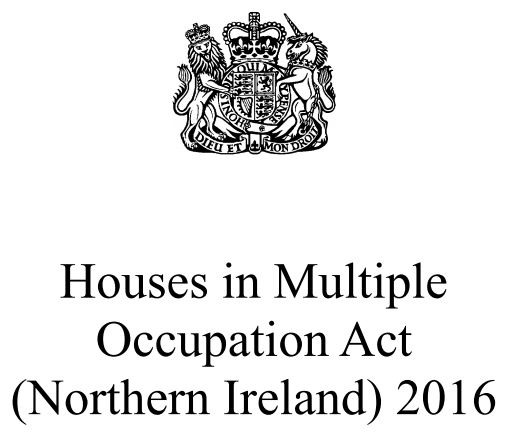Houses In Multiple Occupation Act (NI) 2016
Contents |
HMOs – Houses In Multiple Occupation
Licensing laws for Houses In Multiple Occupation (HMOs) in Northern Ireland have changed since 1st April 2019. Landlords and agents will need to know about the new licensing regime and controls.
HMOs were previously controlled by the NI Housing Executive but the new ‘Houses In Multiple Occupation Act (NI) 2016’ has moved that control to local councils and may also result in some houses becoming HMOs by default - whether that's planned that way or not.
What should be known?
First, it will be of comfort to know that professional help is available from many sources such as designers, solicitors and building consultants. HMOs are not a new thing so, whilst the legislation has changed, there are many professionals capable of providing help from day one.
Of course, it is necessary to know what an HMO is to understand the effect of this new legislation. In summary, an HMO is a property which is:
- living accommodation
- the main residence of three or more people who are from more than two households, and
- rented by at least one of the people living in the accommodation.
So for example, if a typical house in Northern Ireland is shared by students or young professionals the landlord needs to start thinking beyond the established notion that “it’s only friends sharing a house” – are there three or more tenants? If so and they’re not related then landlords need to think about how they’re going to comply with their new responsibilities.
What should be done?
Landlords will need to apply for and maintain a valid licence for each HMO they own. The fees are fairly high, and they’re an annual cost so they need to start adjusting their budgets.
They should also know that Councils can refuse a licence if they believe an area has too many HMOs already – so landlords might need to bear this in mind for future income planning.
Planning
Landlords need to prove to the Council that they have Planning Permission and Building Control Approval for their property allowing its use as an HMO. They are not covered simply because the property has always been a house - HMOs are one of the uses that N Ireland Planning legislation classes as ‘sui generis’, ie a class of its own. We can see this requirement catching out many first-time applicants, potentially leading to further enforcement action by a Council Planning department.
Conditions
Also, landlords can expect their HMO licence to come with a few conditions attached. As well as conditions relating to the physical property, tenants’ rights, anti-social behaviour and neighbourhood concerns, they can also expect the licence to limit them to a maximum number of tenants – they'll need to consider how that affects their financial planning.
Fixed penalties
Unsurprisingly, the legislators have an answer for anyone who breaches the legislation and if they choose to enforce against a landlord they’ve a few options open to them, including fixed penalties of up to £20,000.
Opportunities
Of course, it’s not all doom and gloom. The legislation has been introduced for a reason, and responsible landlords operating on reasonable margins should probably come out of this alright. In fact, if the Councils do come down hard on rogue landlords, others may well find demand outstripping supply and they could be enjoying additional income as a reward for their integrity.
--Colin Logan 17:36, 04 Apr 2019 (BST)
Related articles on Designing Buildings Wiki
Featured articles and news
Scottish parents prioritise construction and apprenticeships
CIOB data released for Scottish Apprenticeship Week shows construction as top potential career path.
From a Green to a White Paper and the proposal of a General Safety Requirement for construction products.
Creativity, conservation and craft at Barley Studio. Book review.
The challenge as PFI agreements come to an end
How construction deals with inherited assets built under long-term contracts.
Skills plan for engineering and building services
Comprehensive industry report highlights persistent skills challenges across the sector.
Choosing the right design team for a D&B Contract
An architect explains the nature and needs of working within this common procurement route.
Statement from the Interim Chief Construction Advisor
Thouria Istephan; Architect and inquiry panel member outlines ongoing work, priorities and next steps.
The 2025 draft NPPF in brief with indicative responses
Local verses National and suitable verses sustainable: Consultation open for just over one week.
Increased vigilance on VAT Domestic Reverse Charge
HMRC bearing down with increasing force on construction consultant says.
Call for greater recognition of professional standards
Chartered bodies representing more than 1.5 million individuals have written to the UK Government.
Cutting carbon, cost and risk in estate management
Lessons from Cardiff Met’s “Halve the Half” initiative.
Inspiring the next generation to fulfil an electrified future
Technical Manager at ECA on the importance of engagement between industry and education.
Repairing historic stone and slate roofs
The need for a code of practice and technical advice note.
Environmental compliance; a checklist for 2026
Legislative changes, policy shifts, phased rollouts, and compliance updates to be aware of.





















